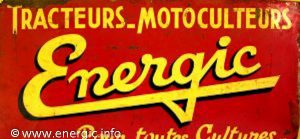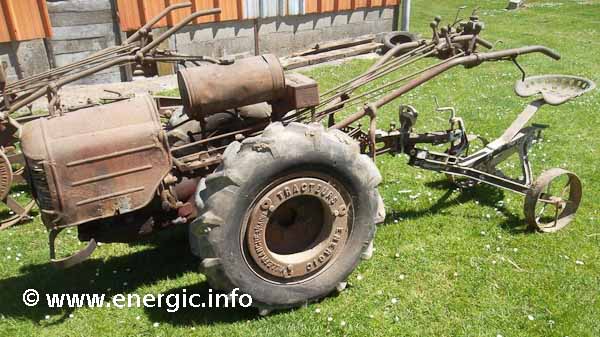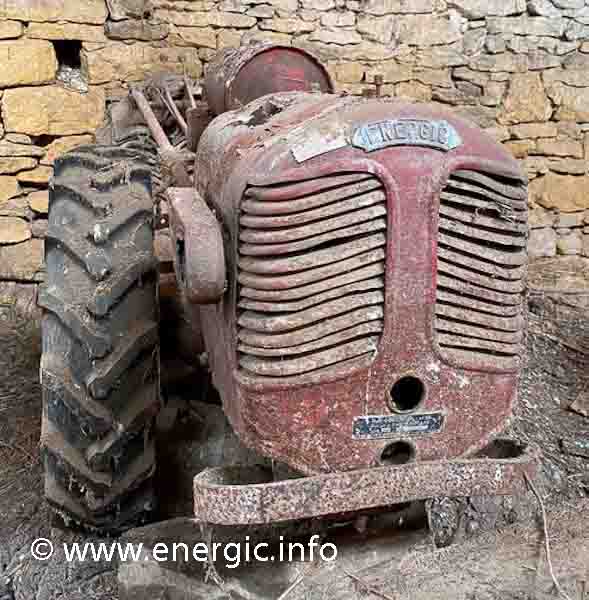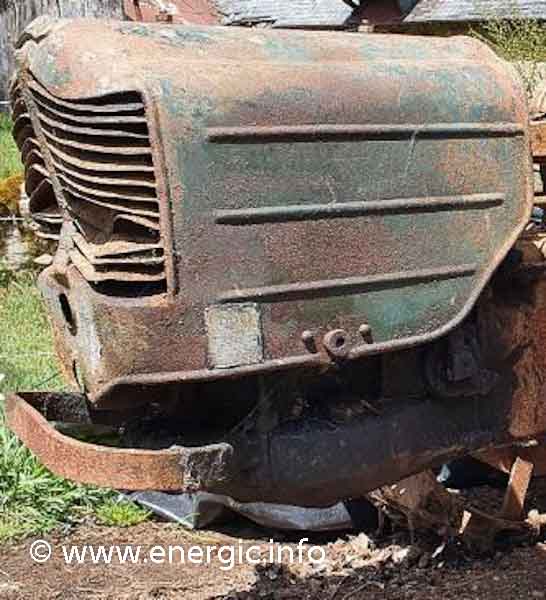
Energic 409 Motoculteur available from 1945
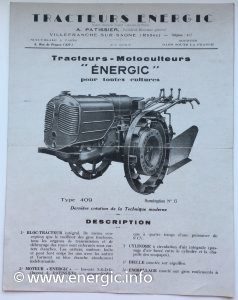
Energic’s new concept of all in-house design and manufactured multiculteur was worked on from the initial concept, drawing board to production prototypes between 1939 and 1940. The first full-production model manufactured was the Energic 409 (500cc) 3V, which was of a complete in-house design and manufacture. (This was after many early energic prototypes were field-tested including an Energic 407 motoculteur 5cv and 7cv with a smaller 350/400cc engine/moteur and 2 strokes). It was the first time Energic had manufactured its own engines as well as the chassis etc. A huge step forward for efficiency of production, costs etc. This also included design developments including the integration of all the component parts for the wheel clutches that overcame a historical problem in the earlier Energic C7 and D9 ranges before the war. (That of the ingress of mud, dirt etc, eroding the wheel hubs, clutch movement pins and general wear). Placing these parts internally meant they could be adequately lubricated and protected from the wear and tear of active duty.
I have seen an order dating from June 1942 for the New Energic 409 awaiting homologué, with information showing authorizations relating to the New 409 as early as 20 May 1941.
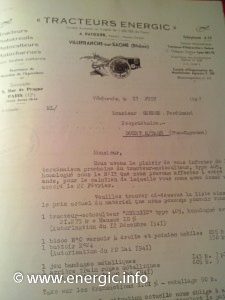
Bon De Commande dated 1/3/1940 for an Energic D9.
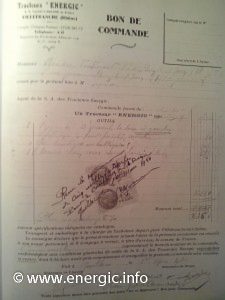
1943 letter;
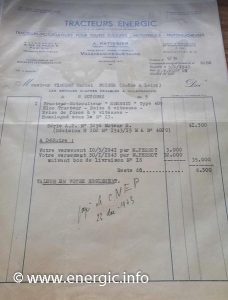
Letter dating from 22/12/1943 for the New Energic 409 motoculteur series A2 model no 3296. Ordered 10/05/1941.
Delivery letter 1943;
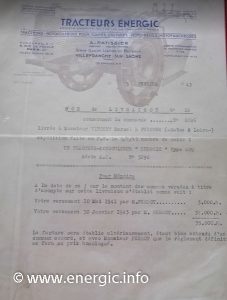
Delivery letter dating from 5/02/1943 for the New Energic 409 motoculteur after payment of the balance 32,000 fr. on 30/01/1943.
Guarantee document 5/02/1943.
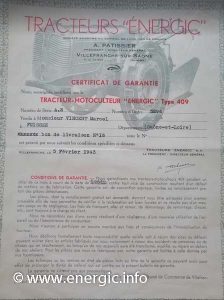
Gaurantee document dating from 5/02/1943 for the New Energic 409 motoculteur.
Interestingly I have an Energic 409 “Manual entretien” dated and printed “May 1945“.
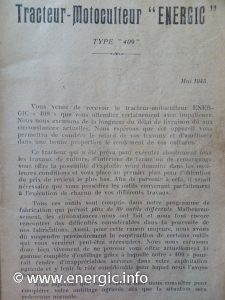
And a Energic “catalogue des piéces détachées” dated 1946.
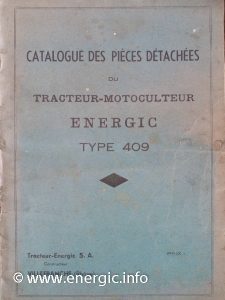
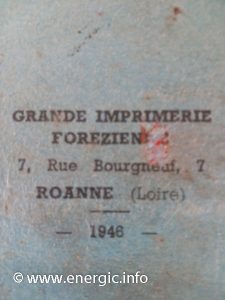
This very early Energic 409 motoculteur model had an open trap door on top of the hood for access, in the initial design. This was dropped in later models as the Energic 409 evolved. Mr Patissier had looked at the overall design and had incorporated the strength and structures of the tractors of that time. With a strong chassis, engine and versatile multi-disc oil bath clutch this Energic motoculteur was the basis of all to follow. There were also numerous engineering solutions and innovations on these early machines, overcoming some of the fundamental problems inherent in the early Energic B5, C7 and D9 machines.
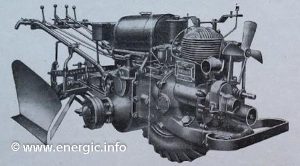
Energic motoculteur 409 early cross section.
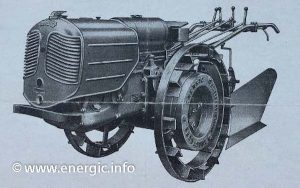
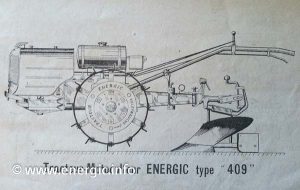
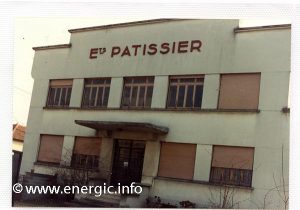
Energic factory front view.
Further early model photos;
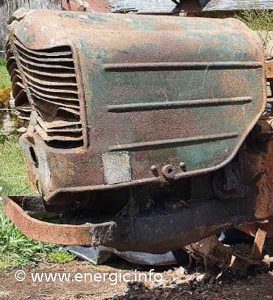
Energic motoculteur 409 early model note the positioning of the plaque.
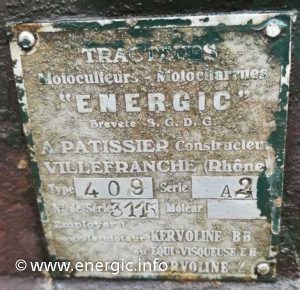
Close-up of a very early Energic 409 plaque using the previous Energic models aluminium plaque and design seen on the Energic C7 and D9 models.
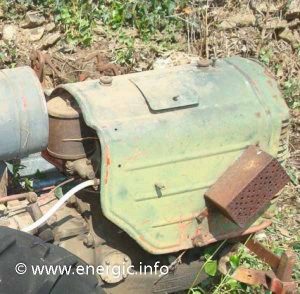
The Energic trap door access to the engine carburettor.
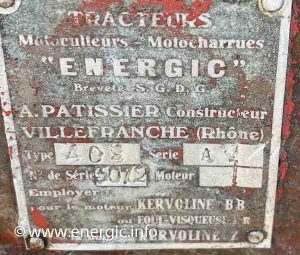
Energic 409 early plaque.
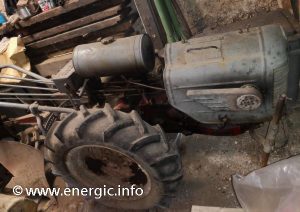
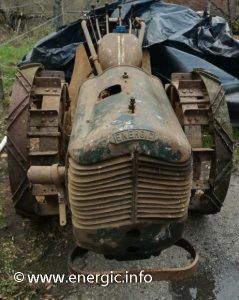
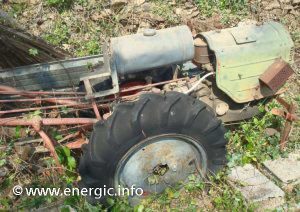
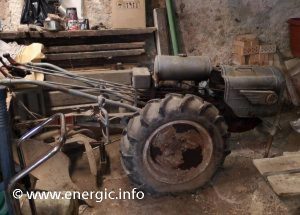
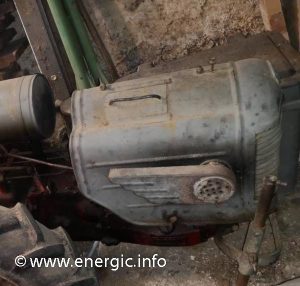
Energic motoculteur 409 early model inspection/trap door model.
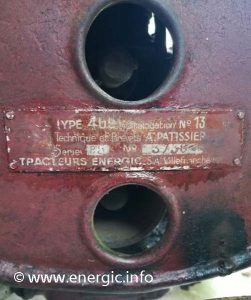
Energic 409 motoculteur early model changed to the traditional red paint.
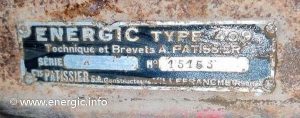
Energic 409 motoculteur early plaque.
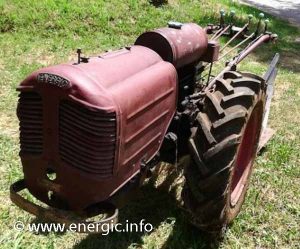
This was followed by the Energic 411 motoculteur 11cv (700cc) in 1949/50 – seepage on the 411 motoculteur here.
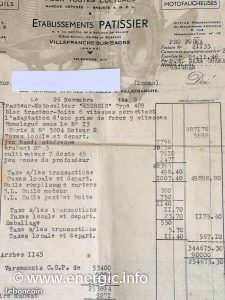
Early order for a Energic motoculteur 409 26/11/1948.
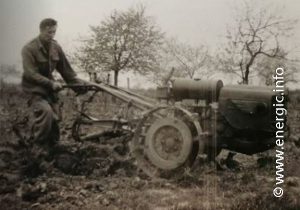
Energic 409 early plaque, in action fieldwork.
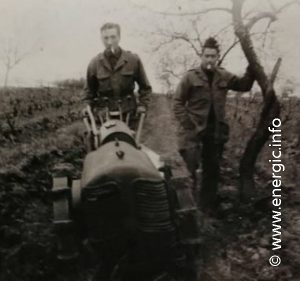
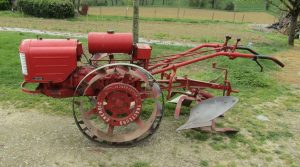
Energic motoculteur 409 early model with metal wheels.
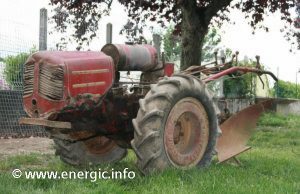
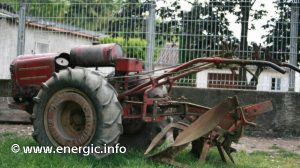
Engine. Single-cylinder Patissier engine, 9cv, 500cm3, air-cooled, four-stroke with enclosed Lateral valves (soupapes latérales).
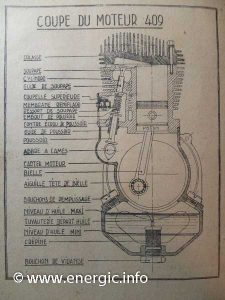
Energic motoculteur 409 moteur.
Lubrication. By constant circulation of oil held within the sump of the engine, 3.5 litres. The circulation pressure being attained from crankcase compression.
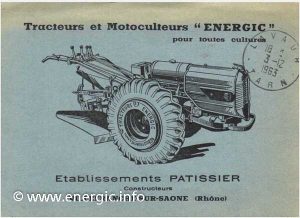
Energic 409 postcard -front. www.energic.info
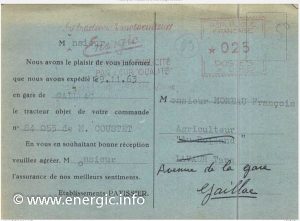
Energic 409 postcard – rear. www.energic.info
Cooling. One large aluminium fan is mounted at the front of the engine, running on ball bearings. This system draws air into the hood circulating around the engine, ensuring cooling. this system was tested in extremely high temperatures and proved effective.
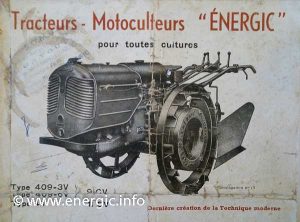
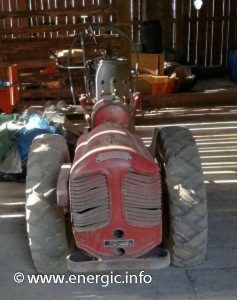
Starting. By hand crank, either directly onto the motor or via the multiplicator. Both are located at the front of the engine.
Magneto/Magnéto. Morel CT – 1 or Lavallete, as standard equipment (also Bosch and Novi brands were used between 1945 and the 1960s to a lesser extent).
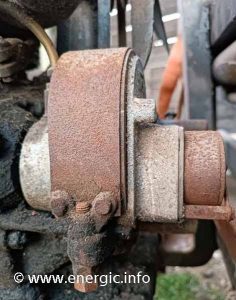
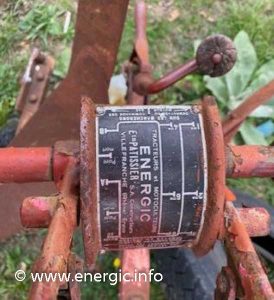
The motoculteur 409 operating 6 gears panel/levers.
Air filter/Cleaner. Metallic element – (dependent upon the element that can be oil surface coated).
Carburetor/Carburateur. Zenith 26 TH, standard. (later models sometimes had a Zenith 28 RXZ – first installed in the 511, 411 tracteurs and motoculteurs – as a replacement repair).
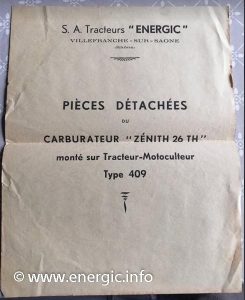
Energic Motoculteur 409 9cv Carburetor/Carburateur pieces catalogue.
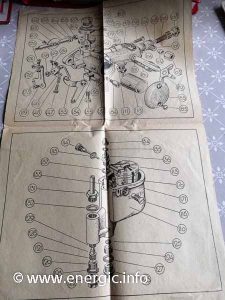
Energic Motoculteur 409 9cv Carburetor/Carburateur pieces breakdown.
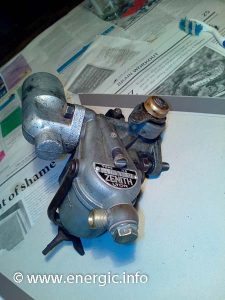
Energic Motoculteur 409 9cv Carburetor/Carburateur Type Zenith (Lyon) 26TH.

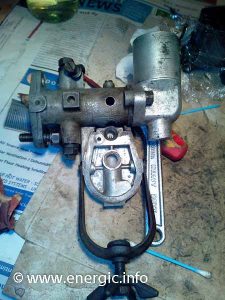
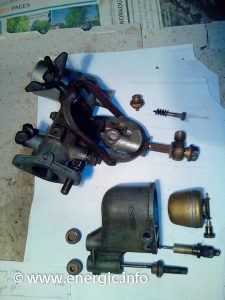
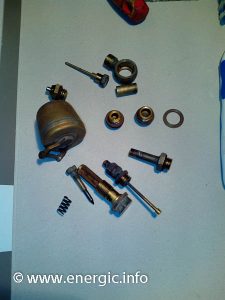
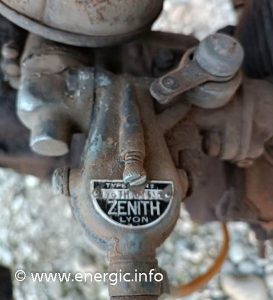
The Zenith 26TH carburettor was stripped down to component parts.
Gears. The three-speed gearbox is built within the engine offering 2 variations s either 3 forward and 1 reverse or 6 forward and 3 reverse gears.
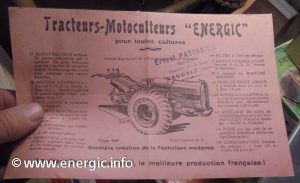
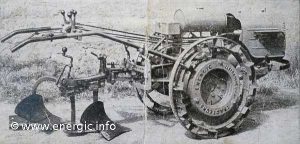
Reverse. 3 speeds are available in reverse depending upon the options. The application of reverse gear lifts the plough out of the ground. This is also used for manoeuvring the motoculteur.
Clutch. Multiple disc type are immersed in oil, within the chassis casing. PTO; front (revolving at the speed of the engine), side and rear (turning between 125 and 1800 rp/m). ( PTO rear and side options).
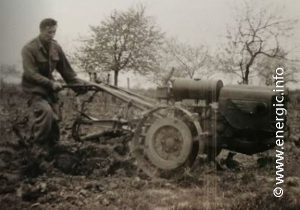
Energic 409 in action.
Speeds. With 1st gear giving 1.81kmph, 2nd – 2.49kmph, 3rd – 3.39kmph, 4th 5.79kmph, 5th 7.74kmph and 6th gear giving 10.45kms per hour. @ 2000 rpm.
Exhaust/Silencer. Fitted in a frontal position, away from the driver.
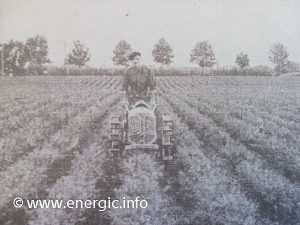
Energic motoculteur 409 harrowing.
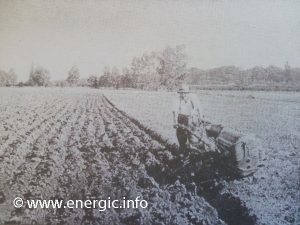
Energic motoculteur 409 ploughing.
Steering. Independent wheel clutches make steering very easy. De-clutching one wheel, and using reverse gear allows the motoculteur to be turned in its own width without undue effort.
Wheels. 3 options; Pneumatic Dunlop CR Tyre wheels 750 x 18 for ploughing (labour) and 650 x 16 or T 32 for drilling ( Fraisage), metal paddle wheels and spud/rounded spikes metal wheels. (special smaller Marachère metal wheels of 50 cms could be additionally ordered for the adaption rotavator and 70 cms for ploughing). The blockage is independent for each wheel. Wheel width is regular-able between 64 cms and 85 cms in 9 settings. In metal wheels 53 cms to 83 cms.
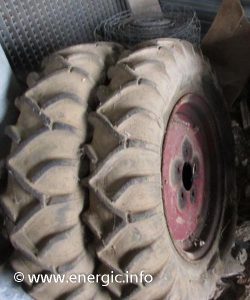
Energic motoculteur 409. With original Michelin treads. www.energic.info
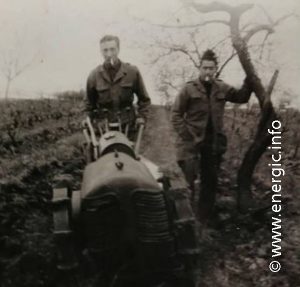
Energic 409 fieldwork.
Hitch. Articulated pivoted strengthened bar, Breveté system S.G.D.G. (patented in France and the UK), with universal fitment to all ancillary equipment. Enabling the adjustment of draft and other characteristics required to operate the implements at different depths.
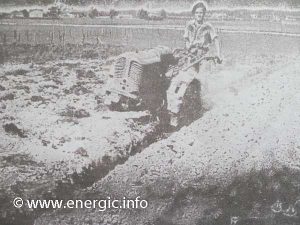
Energic motoculteur 409 ploughing, early model.
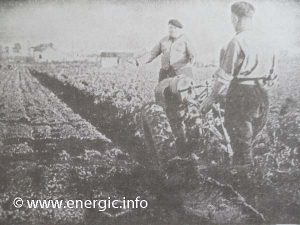
Energic motoculteur 409 cutting Hay.
Ploughing depth. Up to 12 ins (30,48 cms) dependent upon soil conditions.
Fuel consumption. 1 1/4 to 1 1/2 litres of fuel per hour dependent upon working conditions. The tank holds approx. 9 litres.
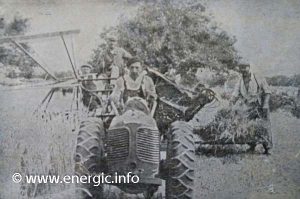
Energic motoculteur 409 cutting Harvesting.
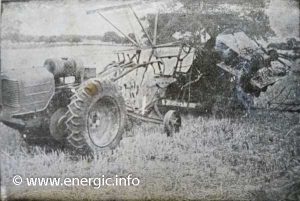
Energic motoculteur 409 cutting Harvesting.
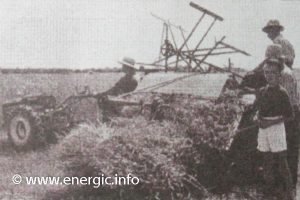
Energic 409 motoculteur with hay cutter.
Dimensions. 2.6m long
Weight. 470/490kgs
Optional equipment for Energic motoculteur 409 models; Rotivator/Fraise, High pressure reservoir for the the treatment of fruit trees/pulvérisateur haute pression pour le traitement des arbes fruitiers. Trailer/remorquages.
Front and rear power take-off (PTO).
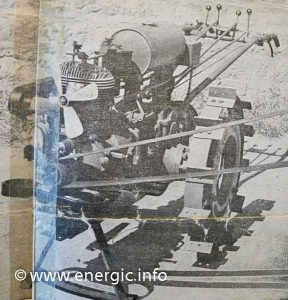
Energic belt power front.
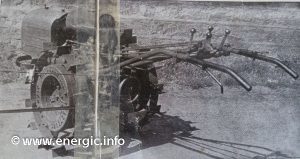
Energic belt power rear set up.
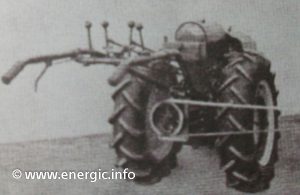
PTO operating mechanics – front of the motoculteur;
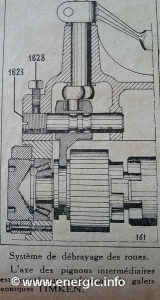
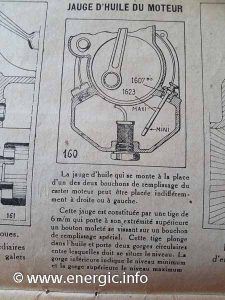
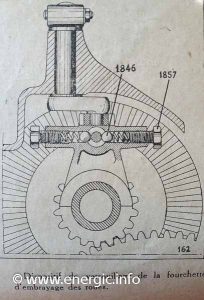
Jauge d’huile du moteur.
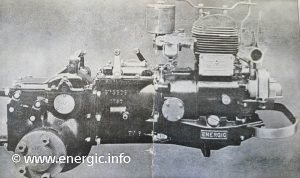
Energic chassis, showing the strength of the design for the 409 motoculteur.
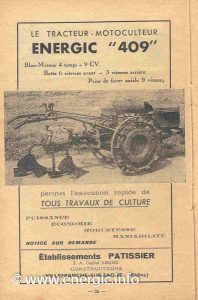
Energic 409 motoculteur brochure.
***
Energic 409 model adaption options *********************
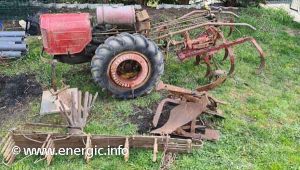
Energic 409 implement selection.
*************
Bavolets protectors, the sensible option in vineyard work;
After the war, the Energic 409 flagship motoculteur could be fitted with Bavolets for vine work (later available on the whole of the 400 series; 410, 411 and 412 motoculteurs). 3 types existed. No.1; just the wheel itself, No. 2; the leading edges onto the wheel and finally No. 3; the all-enveloping “envelopment” protector which streamlined the whole machine for easy passage through the vines and close orchard work. option 3 means that some of the lever control needed to be routed over the fuel tank.
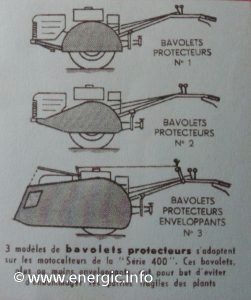
Rotavator/Fraise Rotative;
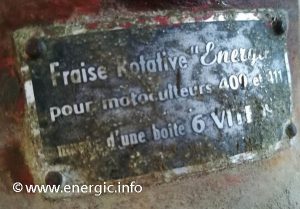
Energic series 400 motoculteur rotivator plaque.
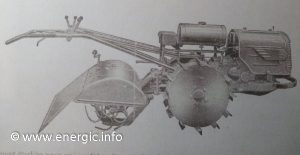
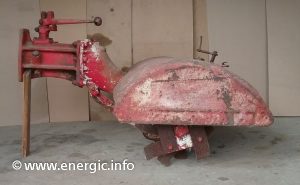
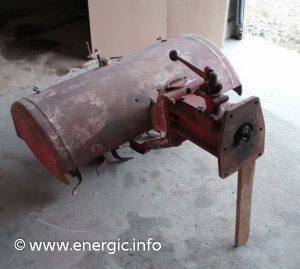
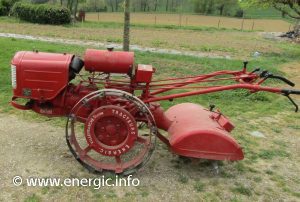
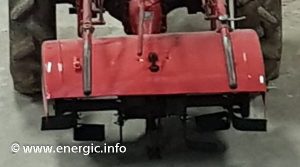
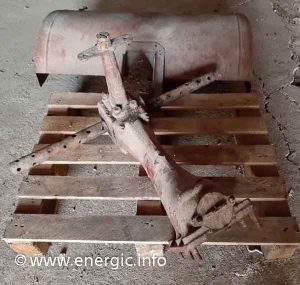
This adaption can be mounted quickly onto a rear PTO of the Energic 409. The dents are 75 cms, with a width of 80 cms.
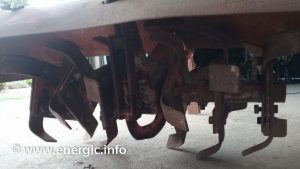
Energic Motoculteur 409 rotivator blades.
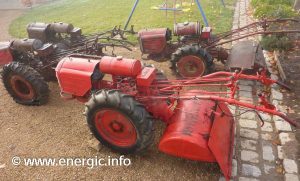
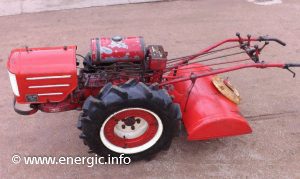
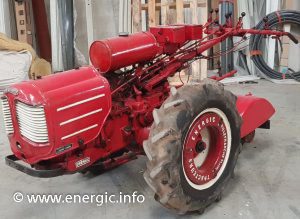
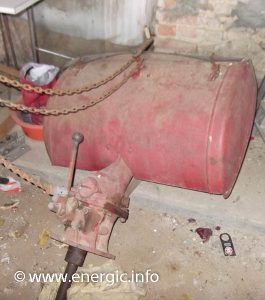
The extra weight was sometimes required in hard/compact soil to enable the rotavator to bite and not bounce on the tougher surfaces.
Spraying/Pulvérisation
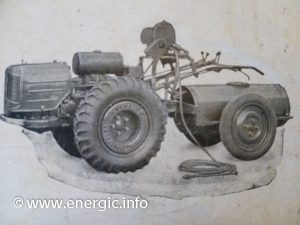
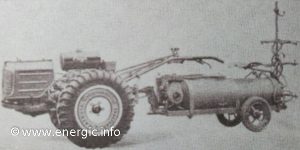
These high-pressure systems were used for spraying vines and fruit trees.
The system on the left-hand side (system 102) for clients with fruit trees. A tender of 200 litres, towed, operated from the PTO lateral could operate 2 lances at high pressure.
The system on the right-hand side (system 103) for clients with fruit trees and vines, it is very easy to assemble and separate from the motoculteur (10 seconds was the boast from Energic). The towed unit is the sprayer and is independent when powered up from the motoculteur.
Hay/grass cutter/Fauchage.
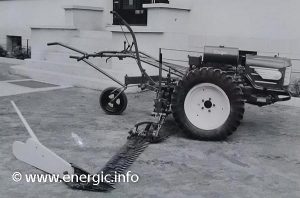
Prototype Energic motoculteur 409 3v, with barre de coupe and supporting rear wheel. Outside the Factory in Villefranche.
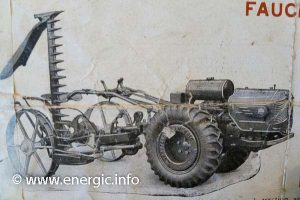
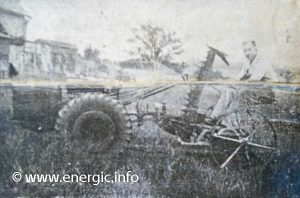
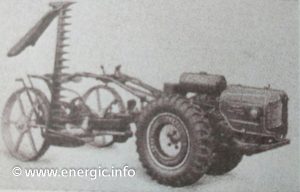
This adaption was one previously used on animals (horses, cattle), here just supplying the pulling power with an Energic motoculteur.
Towing trailers/Remorquage
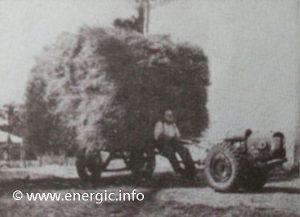
Energic 409 hay mover.
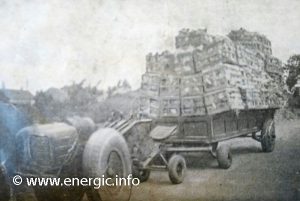
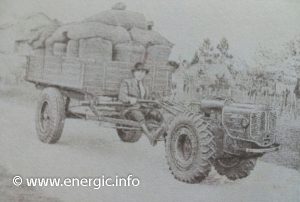
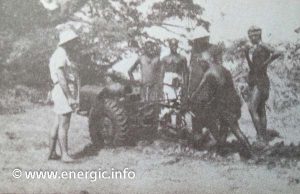
Energic motoculteur abroad in hotter climates.
Energic motoculteur abroad in Africa!
The following implements were available across the Energic 400 series starting on the Energic 409 of 1946 and used throughout the production history;
Cultivateurs/Extirpateur;
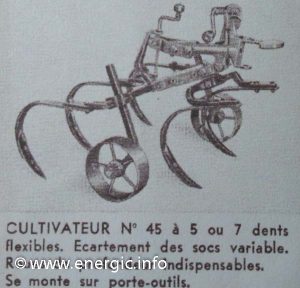
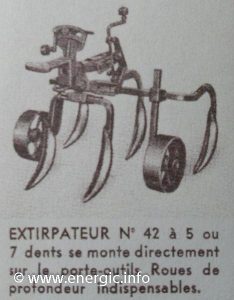
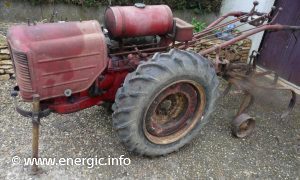
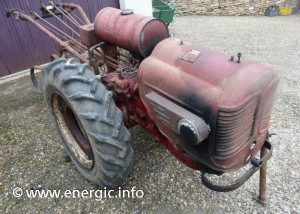
Bineuse
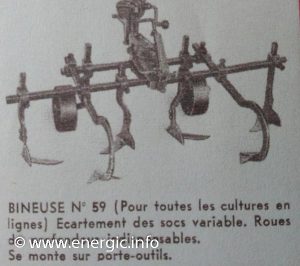
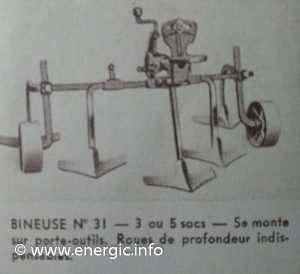
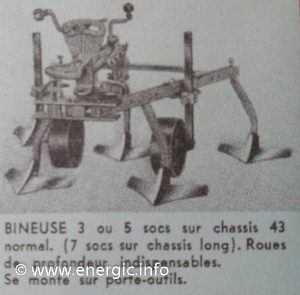
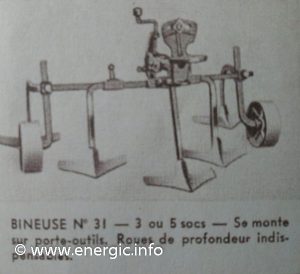
Buttoir
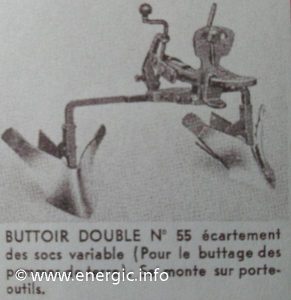
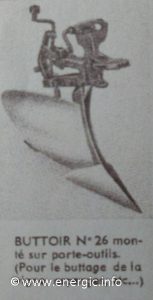
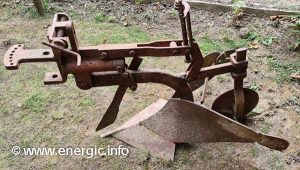
Specialist lifters and cutters
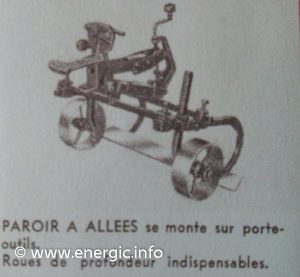
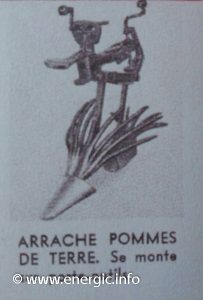
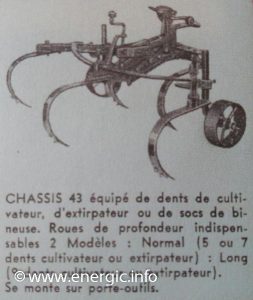
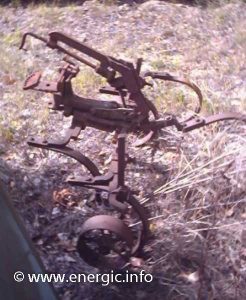
Ploughs;
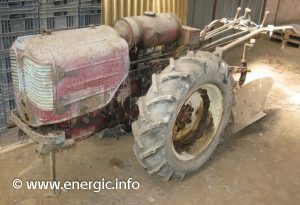
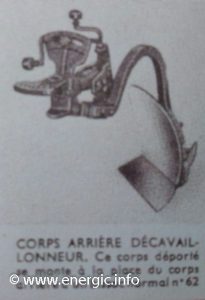
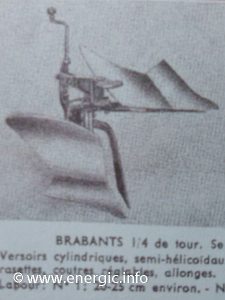
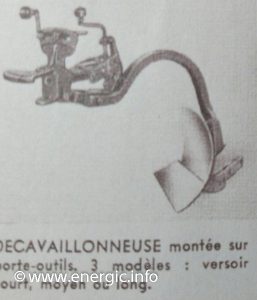
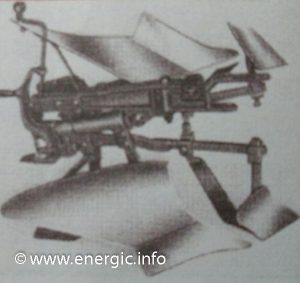
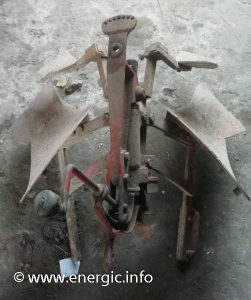
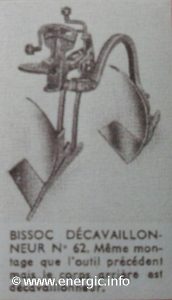
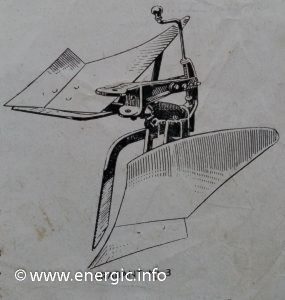
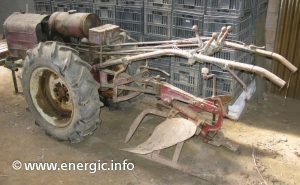
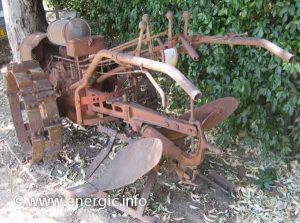
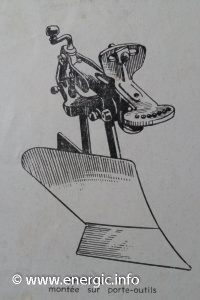
Hitches/Attachments – sulkys
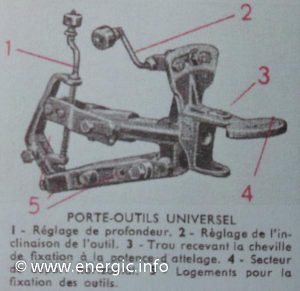
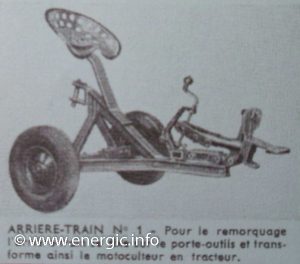
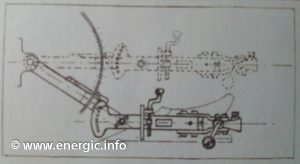
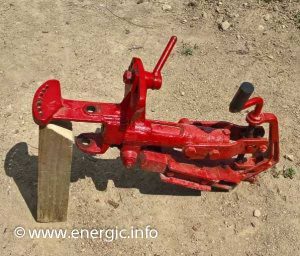
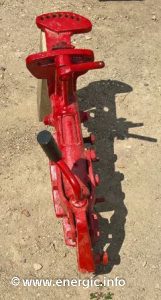
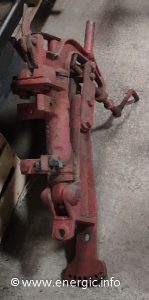
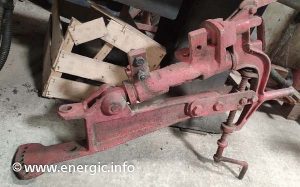


Seed dispenser x 2
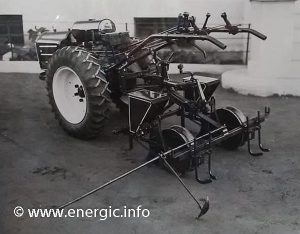

Energic 409 seed dispenser attachment.
Energic Motoculteur 409, 9CV, converted to 4 wheels, Blockage differential, 3 speed forward and 1 reverse.
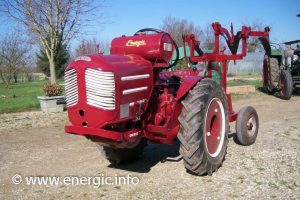

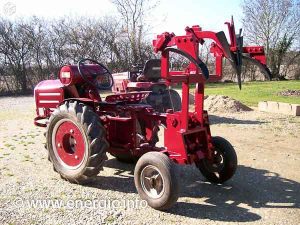

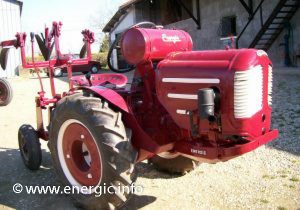

Here is another oddball 409 with a Citroën motor!
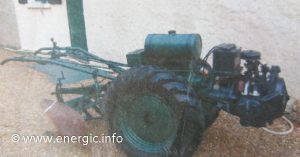

Great stuff old 409 never dies they just get converted!
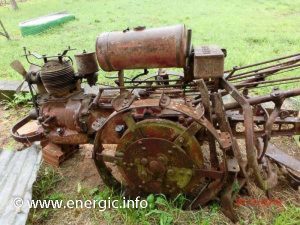

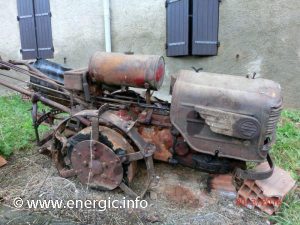

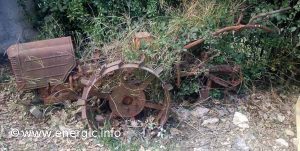


Energic 409 motoculteur awaiting a restoration.
Fancy an electric start.
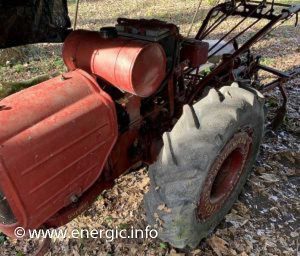

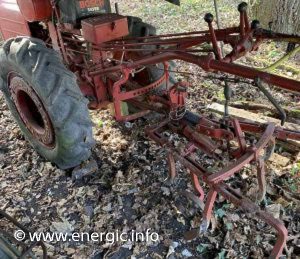

Modified for an electric start. Just reverse the fuel tank then you have space for the battery!
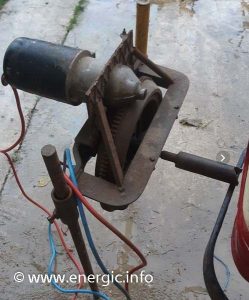

Energic 409 motoculteur heath Robinson electric start option.
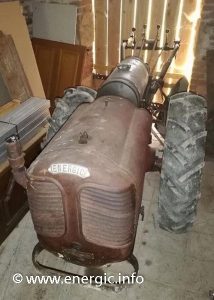

Energic 409 is ready to come out of the barn.
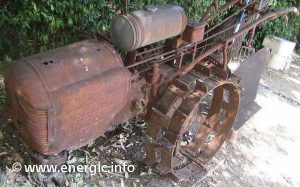

Energic 409, ready to restart.


Energic 409 power to be unleashed.
***Technical illustrations/machine breakdown from “Catalogue des pièces détachées” – parts manual***
Key;
- )Embiellage, 2) Cylindre, Décompresseur, Capot, Support, Pot d’échappement, 3) Carter moteur et distribution.
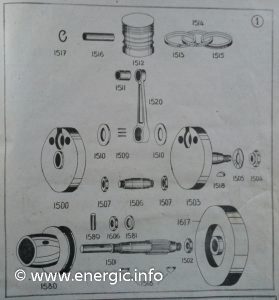

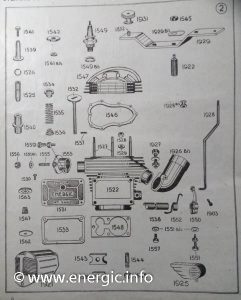

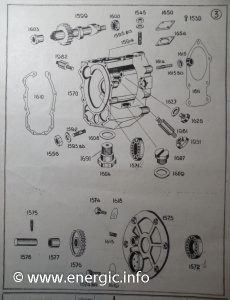

4) Carter avant, Magneto, Pares-chocs, 5) Embrayage, 6) Pompe à huile.
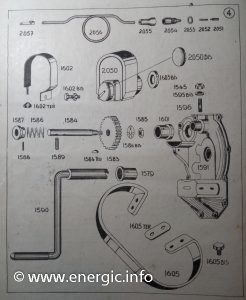

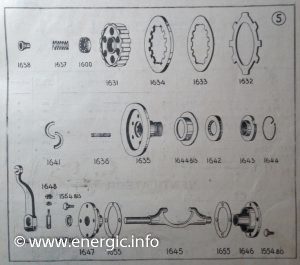



7) Ventilateur, 8) Boite des vitesses, 9) Couvercle de la boite des vitesses.
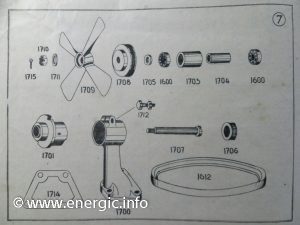

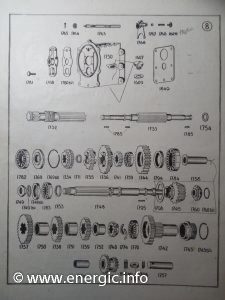

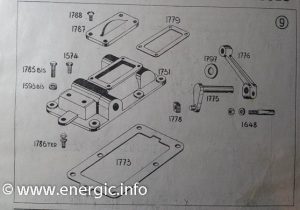

10) Pont arrière, 11) Couvercle du pont arrière, 12) Réservoir d’essence et ses supports,
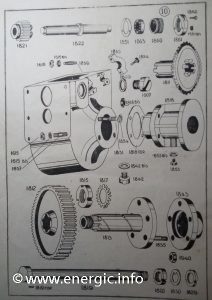

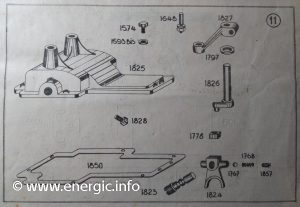

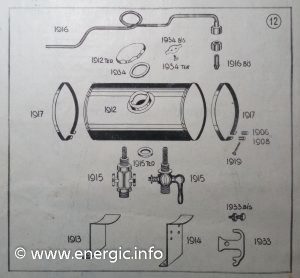

13) Mancherons et commandes,14) Filtre à air, 15) Secteur d’attelage.
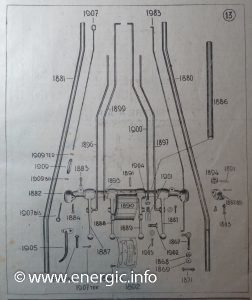

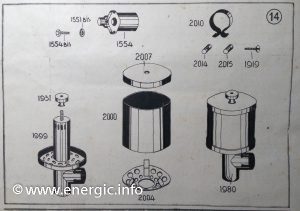

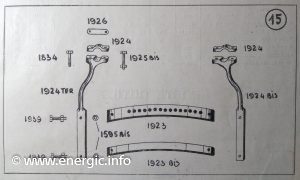

16) Potence, 17) Port-outils, 18) Roues.
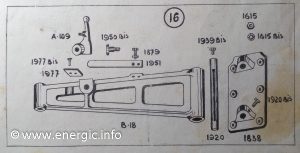

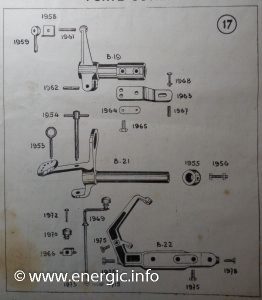

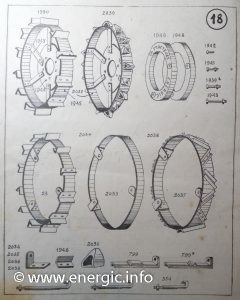

19) Coffre à outils et outillage.
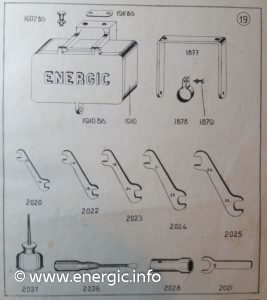

Between 1940 and 1945 there were approx 100/150 motoculteurs manufactured, painted totally in light blue. After 1945 the colour scheme was altered to a beige/cream wheels permutation and the bodywork colour became the standard “Energic” More than 4300 Energic 409 Motoculteurs were manufactured from 1940 to the early 1960s, with serial numbers running from 3000 to approx., 7300. Many still are hard at work today ploughing, rotivating and working the earth as they did in the early 1940s.
Read more about the Energic Motoculteur 410 here.
Read more about the Energic motoculteur 411 here.
Read more about the Energic 412 motoculteur here.
Gallery;
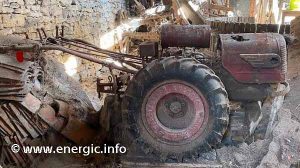

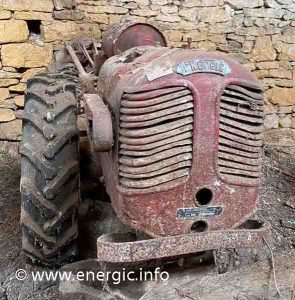

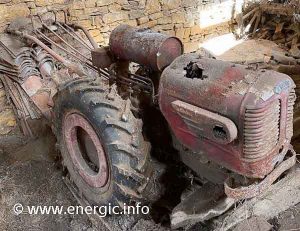



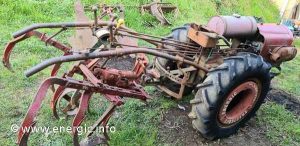

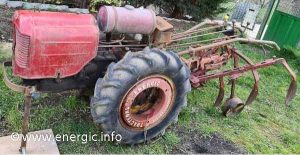

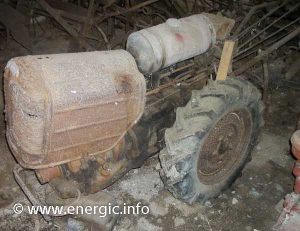

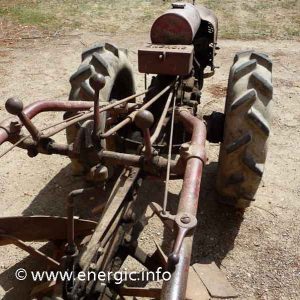

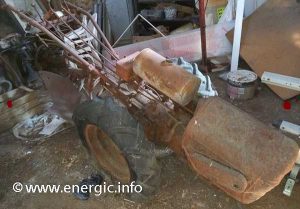

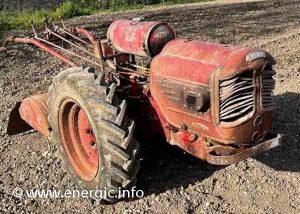

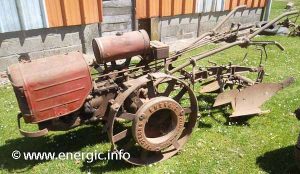

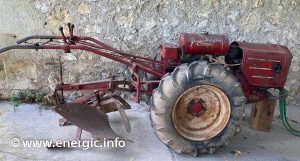

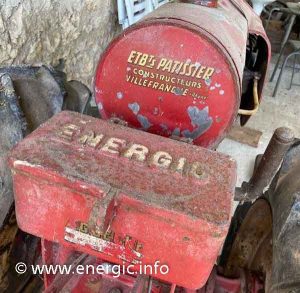

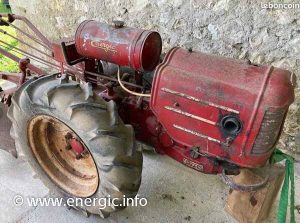

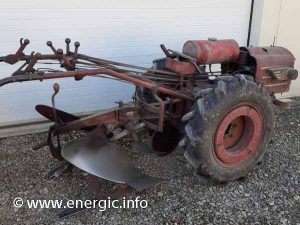

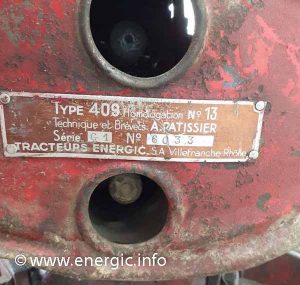

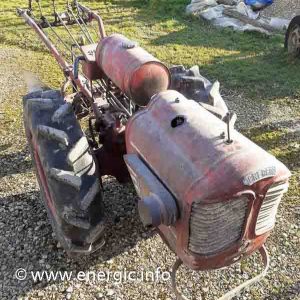







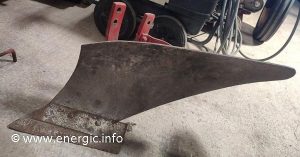

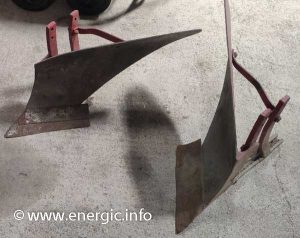

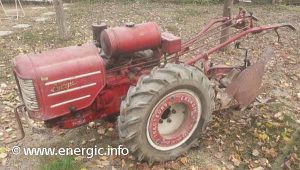

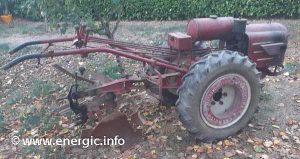

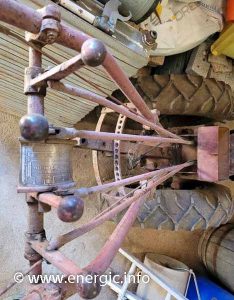

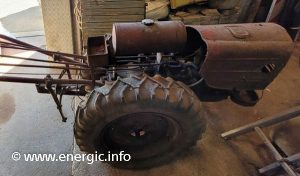

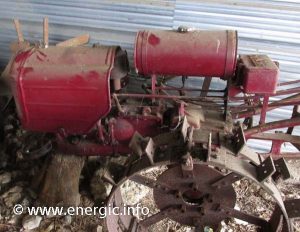

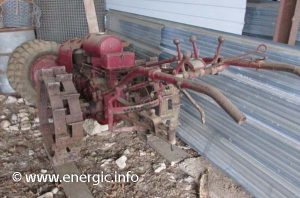

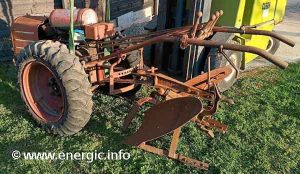




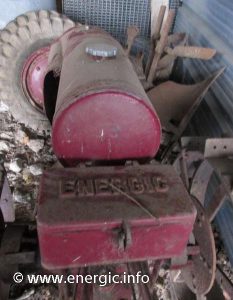

***
See the previous model the Energic C7 & D9, 1932 to 1939 – here;
Read more about Energic motoculteur C7 B4L here.
Read more about Energic motoculteur D9 B5L here.
Read more about Energic motoculteur D9 S Bloc here.
Read more about Energic motoculteur C7 S Bloc here.
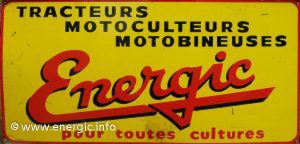

Read more about Energic model history here.
***
Energic Motor suppliers;
Read more about Energic Tracteur 519 T.M.D.Indenor engine/moteur here.
Read more about Energic Engine suppliers Ruggerini here.
Read more about Energic Engine/Moteur supplier Peugeot here.
Read more about Energic Sachs Engines/Moteurs here.
***
See more on Facebook page: www.facebook.com/energic.info
If you like my Facebook page then I can put more information on it./ Si vous aimez ma page Facebook, je peux mettre plus d’informations à ce sujet.
